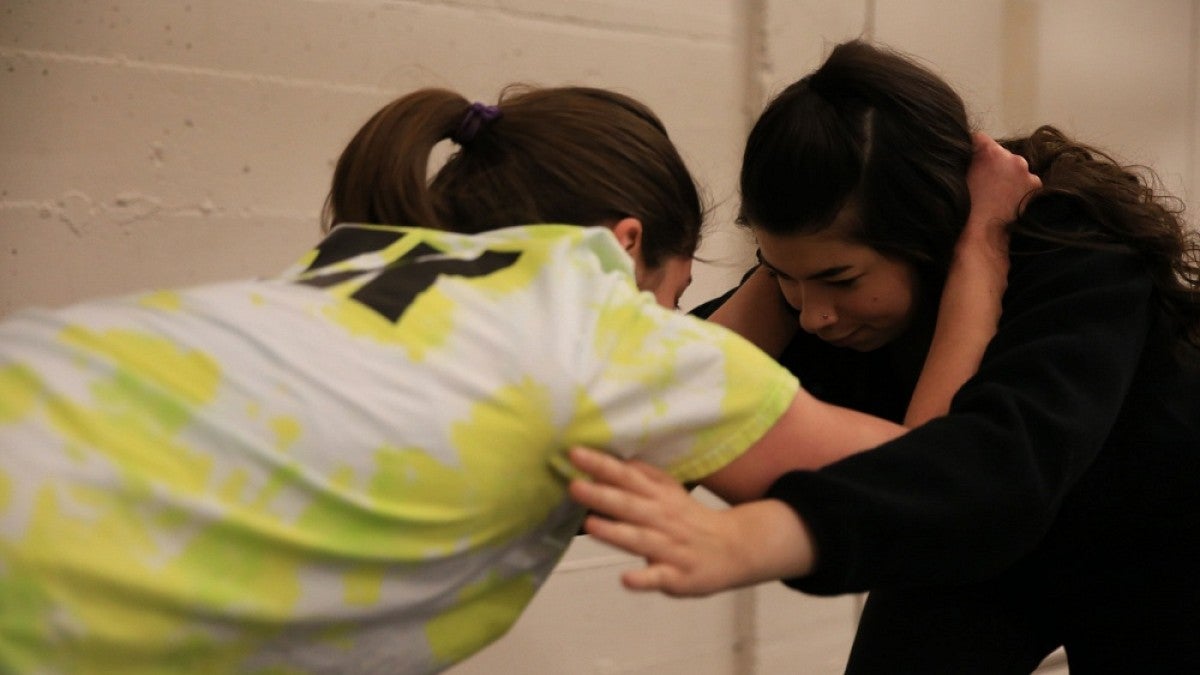The three A’s of self-defense: Awareness, assessment and action.
With this knowledge, hundreds of women at the University of Oregon are better prepared to defend themselves against a physical attack now that they’ve taken one of the women’s self-defense classes co-sponsored by the UO Department of Physical Education and Recreation and the Department of Sociology.
In 2014-15, the UO provided seven women’s self-defense courses and 191 students enrolled. During the current academic year, nine classes will be offered with a total of 257 students completing at least one of the courses by the end of spring term.
RELATED LINKS
To date, that totals out at 448 students, 16 courses and an average class size of 28 women. Those numbers are evidence of an increased interest in women’s self-defense across campus since the university began offering the comprehensive courses two years ago.
“I think people have become more interested in women's self-defense for two reasons: One is the growing awareness about the issue of sexual assault on college campuses. This is due to a variety of factors, including new understandings of Title IX and some high-profile sexual assault cases on college campuses, including our own,” said Jocelyn Hollander, head of the Department of Sociology and one of the self-defense instructors. “The other reason is the increasing evidence that self-defense training reduces women's risk of victimization.”
Indeed, Hollander’s own research, published in Violence Against Women 2014, found that college women who take an empowerment-based self-defense class were less likely to experience an assault during the following year.
The UO self-defense courses are taught by Hollander; Peg Rees, associate director of the Department of Physical Education and Recreation; Ryan Kelly, a senior instructor in physical education; and a few other instructors. The classes are worth two credits per term.
Because most sexual assaults are perpetrated by acquaintances, the course teaches students how to be assertive, how to establish boundaries with people and how to feel empowered through verbal protection, in addition to teaching physical attack prevention skills.
“Our classes give women a wide range of tools they can use to prevent and respond to assault, while at the same time placing blame where it belongs – with the perpetrators,” Hollander said. “Our goal is not to tell women what they should or shouldn’t do, but to help them develop options and empower them to choose the response that is best for them.”
The broad institutional support from the university has been very helpful in marketing the classes to students, providing funding for instructors and for the necessary equipment as well.
“The university has been very supportive of these classes,” Hollander said. “We've received substantial support from the President's office, Student Life, Academic Affairs and the College of Arts and Sciences, which I see as evidence of the university's commitment to addressing the issue of sexual assault on this campus.”
This term, a higher-level women’s self-defense course, for those women who have already completed an introductory course, filled up almost immediately. In the future, the university would like to be able to regularly provide four self-defense classes per term.
“If we could get to four classes a term, that would be amazing,” Rees said. “We have the qualified faculty for it and, unfortunately, we have the need for it.”
For women who were not able to join a self-defense class this term, the Division of Student Life offers workshops for campus groups and other organizations. To find more information on how to sign up and what the workshop will entail, visit their website.
Additionally, the month of April is Sexual Assault Awareness Month across the country. There will be several events at the UO facilitated by the Sexual Violence Prevention and Education team, culminating with the annual Take Back the Night event at 6 p.m. on April 28.
—By Nathaniel Brown, University Communications intern


